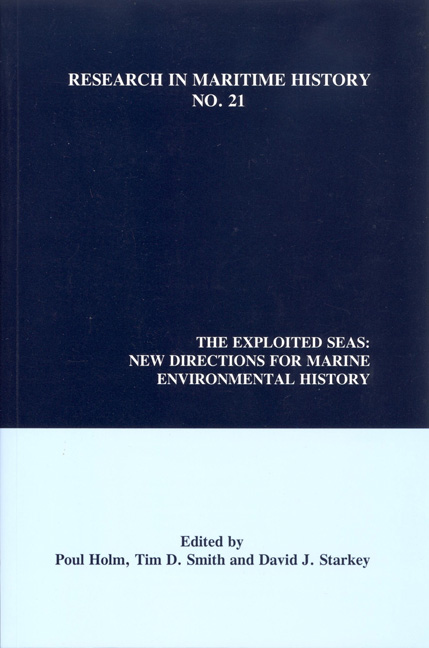Book contents
- Frontmatter
- Contents
- About the Editors
- Contributors
- “Introduction”
- Contributions
- “The Newfoundland Fisheries, c. 1500-1900: A British Perspective”
- “Testing Ecological Models: The Influence of Catch Rates on Settlement of Fishermen in Newfoundland, 1710-1833”
- “Nineteenth-Century Expansion of the Newfoundland Fishery for Atlantic Cod: An Exploration of Underlying Causes”
- “Status and Potential of Historical and Ecological Studies on Russian Fisheries in the White and Barents Seas: The Case of the Atlantic Salmon (Salmo Salar)”
- “The Danish Fisheries, c. 1450-1800: Medieval and Early Modern Sources and Their Potential for Marine Environmental History”
- “Historical Approaches to the Northern California Current Ecosystem”
- “Potential for Historical-Ecological Studies of Latin American Fisheries”
- “The South African Fisheries: A Preliminary Survey of Historical Sources”
- “The Potential for Historical Studies of Fisheries in Australia and New Zealand”
- “Examining Cetacean Ecology Using Historical Fishery Data”
“Epilogue”
from Contributions
- Frontmatter
- Contents
- About the Editors
- Contributors
- “Introduction”
- Contributions
- “The Newfoundland Fisheries, c. 1500-1900: A British Perspective”
- “Testing Ecological Models: The Influence of Catch Rates on Settlement of Fishermen in Newfoundland, 1710-1833”
- “Nineteenth-Century Expansion of the Newfoundland Fishery for Atlantic Cod: An Exploration of Underlying Causes”
- “Status and Potential of Historical and Ecological Studies on Russian Fisheries in the White and Barents Seas: The Case of the Atlantic Salmon (Salmo Salar)”
- “The Danish Fisheries, c. 1450-1800: Medieval and Early Modern Sources and Their Potential for Marine Environmental History”
- “Historical Approaches to the Northern California Current Ecosystem”
- “Potential for Historical-Ecological Studies of Latin American Fisheries”
- “The South African Fisheries: A Preliminary Survey of Historical Sources”
- “The Potential for Historical Studies of Fisheries in Australia and New Zealand”
- “Examining Cetacean Ecology Using Historical Fishery Data”
Summary
The workshop at which the papers that comprise this volume were presented also generated a research agenda for the “History of Marine Animal Populations (HMAP)” project. This agenda, in turn, formed the basis of a proposal that subsequently attracted financial support from the Alfred P. Sloan Foundation (New York City). Having commenced in January 2001, the HMAP initiative provides an historical dimension to the “Census of Marine Life,” a decade-long research program designed to assess and explain the diversity, distribution and abundance of marine life in the world's oceans.
HMAP is an international, interdisciplinary research project. It is based in three institutions: the University of Southern Denmark, the University of Hull, UK, and the University of New Hampshire, USA. These HMAP Centres are responsible for co-ordinating and managing the research efforts of more than fifty historians, ecologists and ecosystem modelers working in thirty-one institutions in eighteen countries. The researchers have been recruited to assemble and analyse historical and paleo-ecological data relating to human harvesting in seven distinct spatial contexts over the past 500 years. Their case studies, which will be completed in 2003, will not only yield information on the impact of historic and contemporary fishing activity on ecosystem dynamics but will also develop methodologies that can be applied more widely to other elements of the marine environment. The seven case studies are: Southwest Pacific (southeast Australian shelf and slope fisheries, New Zealand shelf fisheries); Southwest African Shelf (clupeid fisheries in a continental boundary current system); California Current (clupeid fisheries in a continental boundary current system); Northwest Atlantic (Gulf of Maine, Newfoundland-Grand Banks, Greenland cod fisheries); Norwegian, North and Baltic Seas (multinational cod, herring and plaice fisheries); White and Barents Seas (Russian and Norwegian herring, salmon and cod fisheries); and Whaling Worldwide (historical and twentieth-century whaling in all oceans).
The HMAP workshop identified a series of ecological and historical hypotheses that were incorporated into the design of the project.
- Type
- Chapter
- Information
- The Exploited SeasNew Directions for Marine Environmental History, pp. 215 - 216Publisher: Liverpool University PressPrint publication year: 2001

